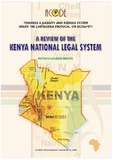A Review Of The Kenya National Legal System

View/
Date
2004Author
Kameri-Mbote, Patricia
Type
Working PaperLanguage
enMetadata
Show full item recordAbstract
The coming into force of the Biosafety Protocol2
charts out a new direction in the
growth and development of modern biotechnology. It is a timely and vital development
given that in a very short time frame, transgenic croplands have increased rapidly. This
decade will witness many African countries adopt and commercialize transgenic crops.
However, efforts to invest have to be guided by sound mechanisms for assessing risks
and benefits. This is crucial to enable African governments to make informed choices
and decisions.
The Protocol, an internationally binding legal instrument concluded by parties to the
Convention on Biological Diversity (CBD), was the result of the work of the Ad hoc
Working Group on Biosafety which was set up in 1995 and completed its work in 2000.
The Protocol aims at comprehensively addressing concerns raised about biotechnology.
These concerns include safe handling, use, and transfer of living modified organisms
(LMOs).3
All Parties to the Protocol have the obligation to comply with its terms.
However, the obligations set out in the Protocol do not fully align with the national
needs and priorities of many African countries. The numerous areas of non-consensus
within the Biosafety Working Group support the validity of this assertion.
4
The Protocol
contains not only elements of compromise but also provisions forced upon by some
parties, particularly African States.5
The indefinite position on liability and redress is
one such issue. However, most African States intend to implement the Protocol and
some have begun putting in place mechanisms for biosafety.6
To provide a suitable
framework for the implementation of the biosafety measures, parties are required to
put in place relevant national legislation.7
For LMOs intended for direct use as feed,
food or processing, only developed countries are obligated to put in place domestic
regulatory frameworks while developing countries including those with economies in
transition need only make decisions based on risk assessments.8 The challenge for
African states is to put in place effective legal and administrative structures to implement
the Protocol. African countries have been particularly concerned about the potential
harmful impacts of biotechnology on their environment and most of them have put in
place precautionary frameworks for biosafety The objective of this paper is to review Kenya s legal system based both on legislation
and common law. The main objective of the review is to analyse the adequacy and
relevance of such regimes to liability and redress for damage caused by transboundary
movement of Living Modified Organisms. It will seek to ascertain principles or provisions
that can help form the country s and regional position in future negotiations for the
elaboration of article 27. As a starting point, the paper will give an overview of the
Protocol s main provisions. We view the Protocol as an environmental impact assessment
aid and this position is borne out by the inclusion of major developments in biotechnology
including the introduction and testing of genetically modified organisms in the Second
Schedule of the Environment Management and Coordination Act (EMCA) as one of the
projects that should undergo environmental impact assessment. We will look at Kenya s
Constitution and other laws and identify the main liability regimes that exist under the
domestic legal framework.
Citation
ACODE Policy Research Series No.8, 2004Publisher
Department of Private Law, University of Nairobi
Collections
- School of Law [80]
